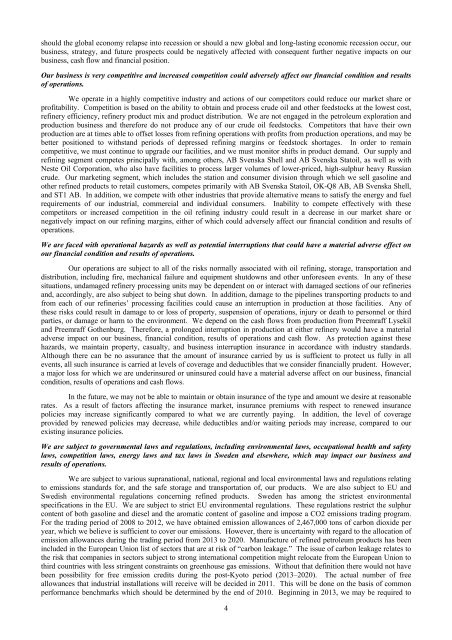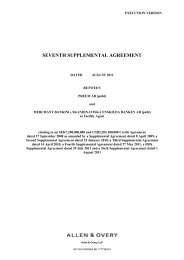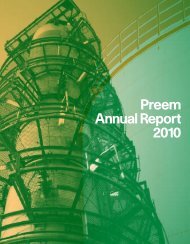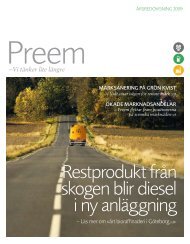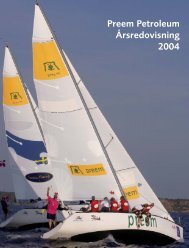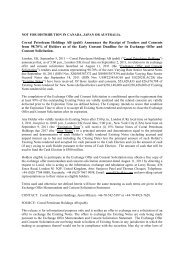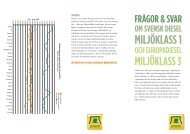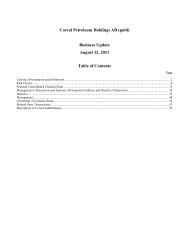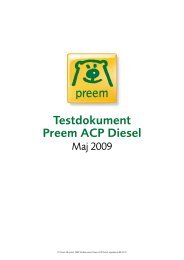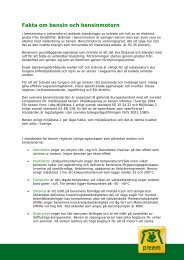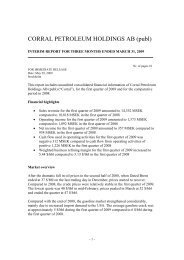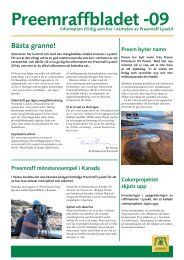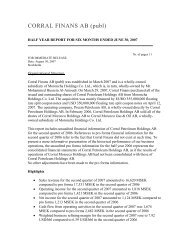the cost of exploring for, developing, producing, processing and marketing crude oil, gas, refined productsand petrochemical products;the availability and worldwide inventory levels of crude oil and refined products;increased trading by financial institutions in the commodity markets;the availability, price and suitability of competitive fuels;evolution of worldwide capacity and, in particular, refining capacity that relates to the petroleum productswe refine;the extent of government regulation, in particular, as it relates to environmental policy;changes in the mandatory product specifications of the European Union and governmental authorities forrefined petroleum products such as the EU Fuel Quality Directive;market imperfections caused by regional price differentials;local market conditions and the level of operations of other refineries in Europe;the cost and availability of transportation for feedstocks and for refined petroleum products and the abilityof suppliers, transporters and purchasers to perform on a timely basis or at all under their agreements(including risks associated with physical delivery);seasonal demand fluctuations;expected and actual weather conditions and natural disasters;changes in technology; andthe impact of environmental regulations.These external factors and the volatile nature of the energy markets make oil-refining margins volatile. Weestimate that a change of $1.00 per barrel in our refining margins would result in a corresponding change in our EBITDAof approximately SEK 840 million. During periods of rising crude oil prices, the cost of replenishing our crude oilinventories increases and, thus, our working capital requirements similarly increase. Generally, an increase or decreasein the price of crude oil results in a corresponding increase or decrease in the price of refined products, although thetiming and magnitude of these increases and decreases may not correspond. During periods of excess inventories ofrefined products, crude oil prices can increase significantly without corresponding increases in refined products pricesand, in such a case, refining margins will be adversely affected. Differentials in the timing and magnitude of movementsin crude oil and refined product prices could have a significant short-term impact on our refining margins and ourbusiness, financial condition and results of operations.In addition, the volatility in costs of fuel and other utility services, principally electricity, used by our refineriesaffects operating costs. Fuel and utility prices have been, and will continue to be, affected by factors outside our control,such as supply and demand for fuel and utility services in both local and regional markets. Future increases in fuel andutility prices may have a negative effect on our results of operations.Increases in global refining and conversion capacity could increase the competition we face and harm our business.Positive trends in the market for petroleum products in recent years have encouraged companies to increase theirrefining and conversion capacity. Although the implementation of any such capacity increases requires some time,further increases in global refining and conversion capacity that are not matched by increased demand can be expected toresult in heightened competition, which could have a material adverse effect on our business, financial condition orresults of operations.Unfavorable general economic conditions have had and may continue to have a negative effect on our business,results of operations, financial condition, and future growth prospects.The economies of Europe and elsewhere have experienced extreme pressure and disruption since August 2007,due largely to the stresses affecting the global financial system, which accelerated significantly in the second half of 2008and into the first quarter of 2009. Most major European countries, the United States and Japan suffered severe recessionsthat have had (and may continue to have) an adverse effect on consumer and business confidence and expenditure.Lower levels of economic activity during periods of recession often result in declines in energy consumption, includingdeclines in the demand for and consumption of our refined products. This has caused and could continue to cause ourrevenues and margins to decline and could negatively affect our refining margins and our business, financial conditionand results of operations. Although major economies started a recovery in late 2009 and continued to grow in 2010,3
should the global economy relapse into recession or should a new global and long-lasting economic recession occur, ourbusiness, strategy, and future prospects could be negatively affected with consequent further negative impacts on ourbusiness, cash flow and financial position.Our business is very competitive and increased competition could adversely affect our financial condition and resultsof operations.We operate in a highly competitive industry and actions of our competitors could reduce our market share orprofitability. Competition is based on the ability to obtain and process crude oil and other feedstocks at the lowest cost,refinery efficiency, refinery product mix and product distribution. We are not engaged in the petroleum exploration andproduction business and therefore do not produce any of our crude oil feedstocks. Competitors that have their ownproduction are at times able to offset losses from refining operations with profits from production operations, and may bebetter positioned to withstand periods of depressed refining margins or feedstock shortages. In order to remaincompetitive, we must continue to upgrade our facilities, and we must monitor shifts in product demand. Our supply andrefining segment competes principally with, among others, <strong>AB</strong> Svenska Shell and <strong>AB</strong> Svenska Statoil, as well as withNeste Oil Corporation, who also have facilities to process larger volumes of lower-priced, high-sulphur heavy Russiancrude. Our marketing segment, which includes the station and consumer division through which we sell gasoline andother refined products to retail customers, competes primarily with <strong>AB</strong> Svenska Statoil, OK-Q8 <strong>AB</strong>, <strong>AB</strong> Svenska Shell,and ST1 <strong>AB</strong>. In addition, we compete with other industries that provide alternative means to satisfy the energy and fuelrequirements of our industrial, commercial and individual consumers. Inability to compete effectively with thesecompetitors or increased competition in the oil refining industry could result in a decrease in our market share ornegatively impact on our refining margins, either of which could adversely affect our financial condition and results ofoperations.We are faced with operational hazards as well as potential interruptions that could have a material adverse effect onour financial condition and results of operations.Our operations are subject to all of the risks normally associated with oil refining, storage, transportation anddistribution, including fire, mechanical failure and equipment shutdowns and other unforeseen events. In any of thesesituations, undamaged refinery processing units may be dependent on or interact with damaged sections of our refineriesand, accordingly, are also subject to being shut down. In addition, damage to the pipelines transporting products to andfrom each of our refineries’ processing facilities could cause an interruption in production at those facilities. Any ofthese risks could result in damage to or loss of property, suspension of operations, injury or death to personnel or thirdparties, or damage or harm to the environment. We depend on the cash flows from production from <strong>Preem</strong>raff Lysekiland <strong>Preem</strong>raff Gothenburg. Therefore, a prolonged interruption in production at either refinery would have a materialadverse impact on our business, financial condition, results of operations and cash flow. As protection against thesehazards, we maintain property, casualty, and business interruption insurance in accordance with industry standards.Although there can be no assurance that the amount of insurance carried by us is sufficient to protect us fully in allevents, all such insurance is carried at levels of coverage and deductibles that we consider financially prudent. However,a major loss for which we are underinsured or uninsured could have a material adverse affect on our business, financialcondition, results of operations and cash flows.In the future, we may not be able to maintain or obtain insurance of the type and amount we desire at reasonablerates. As a result of factors affecting the insurance market, insurance premiums with respect to renewed insurancepolicies may increase significantly compared to what we are currently paying. In addition, the level of coverageprovided by renewed policies may decrease, while deductibles and/or waiting periods may increase, compared to ourexisting insurance policies.We are subject to governmental laws and regulations, including environmental laws, occupational health and safetylaws, competition laws, energy laws and tax laws in Sweden and elsewhere, which may impact our business andresults of operations.We are subject to various supranational, national, regional and local environmental laws and regulations relatingto emissions standards for, and the safe storage and transportation of, our products. We are also subject to EU andSwedish environmental regulations concerning refined products. Sweden has among the strictest environmentalspecifications in the EU. We are subject to strict EU environmental regulations. These regulations restrict the sulphurcontent of both gasoline and diesel and the aromatic content of gasoline and impose a CO2 emissions trading program.For the trading period of 2008 to 2012, we have obtained emission allowances of 2,467,000 tons of carbon dioxide peryear, which we believe is sufficient to cover our emissions. However, there is uncertainty with regard to the allocation ofemission allowances during the trading period from 2013 to 2020. Manufacture of refined petroleum products has beenincluded in the European Union list of sectors that are at risk of “carbon leakage.” The issue of carbon leakage relates tothe risk that companies in sectors subject to strong international competition might relocate from the European Union tothird countries with less stringent constraints on greenhouse gas emissions. Without that definition there would not havebeen possibility for free emission credits during the post-Kyoto period (2013–2020). The actual number of freeallowances that industrial installations will receive will be decided in 2011. This will be done on the basis of commonperformance benchmarks which should be determined by the end of 2010. Beginning in 2013, we may be required to4
- Page 2: TABLE OF CONTENTSDisclosure Regardi
- Page 5: which was merged into Preem on Octo
- Page 8 and 9: RISK FACTORSThe risk factors below
- Page 12 and 13: purchase a minimum of 10% to 20% of
- Page 14 and 15: market price at the time of settlem
- Page 16 and 17: Notes, we would try to obtain waive
- Page 18 and 19: are reasonable grounds for believin
- Page 20 and 21: civil liability, whether or not pre
- Page 22 and 23: SELECTED CONSOLIDATED FINANCIAL DAT
- Page 24 and 25: MANAGEMENT’S DISCUSSION AND ANALY
- Page 26 and 27: Year ended December 31,%2008 2009 C
- Page 28 and 29: arrel in February, increased to app
- Page 30 and 31: (1) Includes sales by our supply an
- Page 32 and 33: SEK 5,519 million, from a loss of S
- Page 34 and 35: Cash flow used in investment activi
- Page 36 and 37: Restrictions on transfers of fundsW
- Page 38 and 39: Variable rate debt—amount due .
- Page 40 and 41: As of December 31, 2008, SEK 21,999
- Page 42 and 43: Our StrengthsOur competitive streng
- Page 44 and 45: Lysekil has a total storage capacit
- Page 46 and 47: Unfinished and Blend Stocks........
- Page 48 and 49: Heating Oil .......................
- Page 50 and 51: Business-to-Business DivisionWe pre
- Page 52 and 53: “.nu,” “.org,” “.biz,”
- Page 54 and 55: Energy AB, Huda Trading AB, the Swe
- Page 56 and 57: was incorporated on March 22, 2007,
- Page 58 and 59: RELATED PARTY TRANSACTIONSCapital T
- Page 60 and 61:
DESCRIPTION OF CERTAIN INDEBTEDNESS
- Page 62 and 63:
effected by the Third Supplemental
- Page 64 and 65:
first ranking mortgage certificates
- Page 66 and 67:
LEGAL INFORMATIONCorral Petroleum H
- Page 68 and 69:
CORRAL PETROLEUM HOLDINGS AB (publ)
- Page 70 and 71:
CORRAL PETROLEUM HOLDINGS AB (publ)
- Page 72 and 73:
CORRAL PETROLEUM HOLDINGS AB (publ)
- Page 74 and 75:
CORRAL PETROLEUM HOLDINGS AB (publ)
- Page 76 and 77:
SubsidiariesSubsidiaries are compan
- Page 78 and 79:
The refinery installations consist
- Page 80 and 81:
of occupational pension insurance,
- Page 82 and 83:
Emission rights 2010LysekilGothenbu
- Page 84 and 85:
NOTE 2. FINANCIAL RISK MANAGEMENTTh
- Page 86 and 87:
In addition to price risk managemen
- Page 88 and 89:
The fair value of borrowing is calc
- Page 90 and 91:
Reconciliation with the Group’s t
- Page 92 and 93:
The Board members including the Cha
- Page 94 and 95:
NOTE 12. EXPENSES BROKEN DOWN BY TY
- Page 96 and 97:
NOTE 16. EXCHANGE RATE DIFFERENCES
- Page 98 and 99:
Equipment, tools, fixtures and fitt
- Page 100 and 101:
NOTE 23. TRADE AND OTHER RECEIVABLE
- Page 102 and 103:
The change in the fair value of pla
- Page 104 and 105:
Loan conditions, effective interest
- Page 106 and 107:
Capitalized interest cost..........
- Page 108:
SalesDecember 31, 2009AccountsPurch


